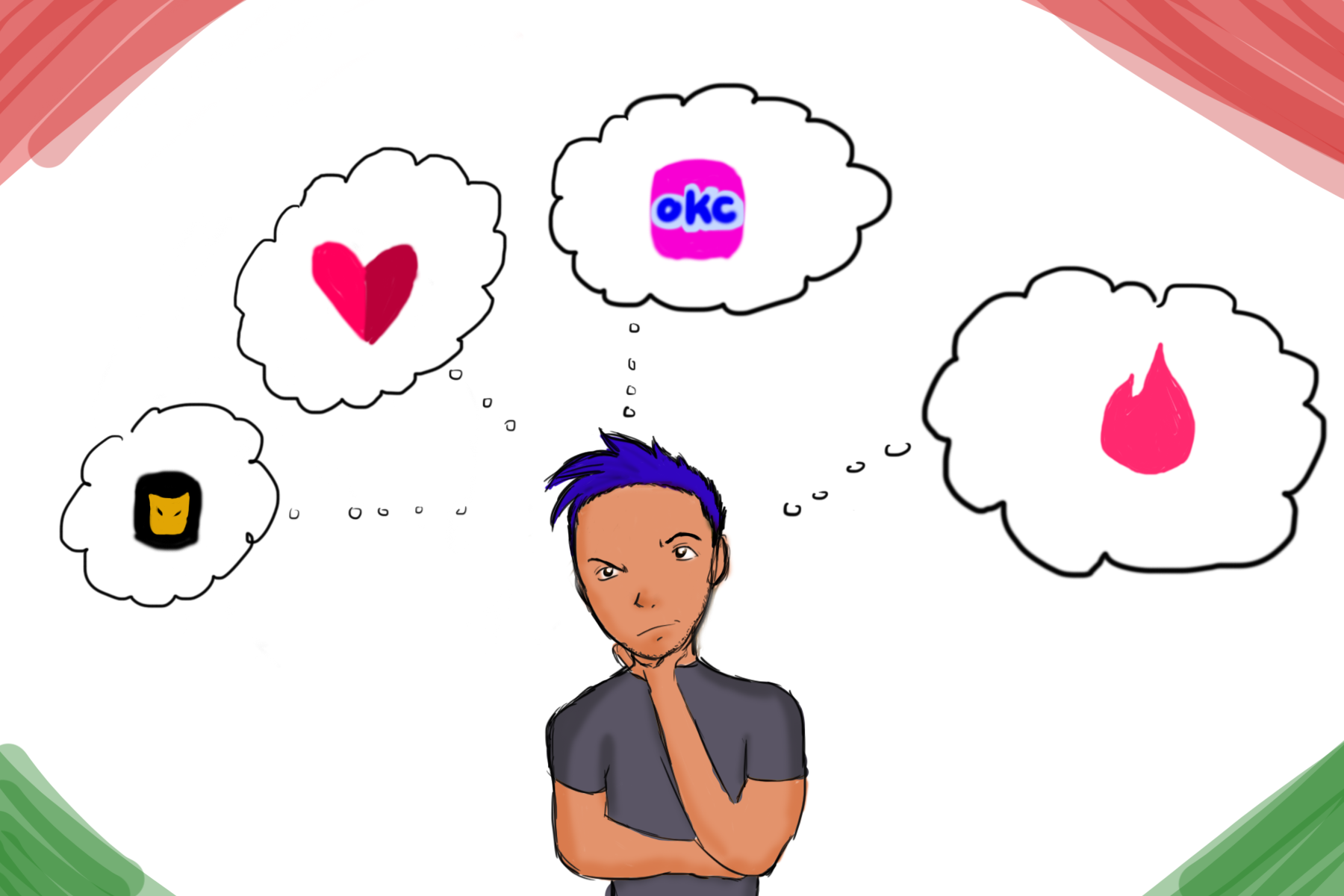If you’re a current college student, the chances that you’ve either used a dating app or know someone that has are incredibly high. You’ve grown up in the era of digital romance. Long gone are the days of working up the courage to ask someone out in person or hanging out in bars with the hope of finding a significant other (or just a fun night). Now is the age of swiping through profiles at one in the morning and sending flirty opening messages with no fear of rejection.
Whether or not these changes are positive is debatable, but the reality is that the dating world has changed immensely over the last decade, and dating practices have evolved with it. This is similar to the gambling industry, where online casino New Jersey websites have made it easy to gamble from the comfort of your own couch, rather than plan a trip to Atlantic City. Just as with online gaming, while there may still be a slight stigma associated with online dating, it’s practically the norm on college campuses, and many people find themselves in lasting relationships as a result.
A quick search will reveal the obscene number of dating and hookup apps on the market. Many of these apps give users the opportunity to decide what kind of relationship they’re looking for; others are more specific. For example, Tinder can be for anything and anyone, while Hinge is supposed to be for people who are interested in committed relationships.
Some of these apps are restricted to particular categories, such as certain sexualities, religions or ages. Others are even more niche, such as sugar daddy/sugar baby relations, threesomes, specific races, various fetishes and many others. Chances are that if you look hard enough, you’ll be able to find an app that suits your preferences. However, if you don’t feel like scrolling through hundreds of options on the app store, here’s a roundup of some of the most popular ones.
1. Tinder
Tinder is easily the most popular dating app among college students. With approximately 57 million users around the world, matches are usually plentiful. It’s incredibly user friendly, with users simply swiping left or right to indicate interest in other profiles. You can also super like someone once a day (in the free version) in order to stand out more. Matches and conversations don’t expire, but you can unmatch with someone at any time. Tinder also provides you with daily “top picks,” which are people that many others have swiped right on and appear to match your preferences.
Like the majority of dating apps, Tinder matches are based on first impressions. In other words, they’re based on physical appearance (and maybe a witty bio). Crude messages are quite common, and while plenty of people find committed partners on Tinder, it tends to be more utilized by people looking for casual interactions. For that reason, Tinder is probably best for easygoing people who aren’t dead set on finding a long-term significant other and just want to get their toes wet in the dating app world.
2. Ashley Madison
Ashley Madison is a dating website that became well-known for serving to individuals seeking extramarital affairs and discreet relationships. The website’s former tagline was “Life is short. Have an affair”. It was founded in 2001 by Darren J. Morgenstern and gained significant attention due to its controversial approach to dating. What is Ashley Madison all about? It’s a platform that targets people who are married or in committed relationships but are looking for additional romantic or sexual connections outside of their primary partnerships. Users could create profiles and connect with others who were also seeking extramarital affairs. The platform provides a space for individuals to explore these relationships privately, often using pseudonyms or false information to maintain their anonymity.
3. Bumble
Bumble was released in 2014, about two years after Tinder, and is very similar to its older counterpart. Users swipe left or right on the profiles of people around them and are matched with anyone that mutually swipes right. The catch is that, in heterosexual matches, the woman has to send the first message (in same sex matches, either can message first).
So, if you’re a heterosexual woman who is tired of receiving crude messages from male matches, Bumble is the way to go. However, you have to be comfortable with making the first move and with potential rejection/ghosting. The first message must also be sent within 24 hours of matching with someone, and a response must be received within an additional 24 hours. This is great for people who don’t want to waste time or be kept waiting, but not so great for people who might want to start conversations with their matches at a later, more convenient time.
Another distinguishing feature of Bumble is that users can choose between “date,” “BFF,” and “bizz.” While dating is what Bumble is best known for, the option to find friends or professionally network is pretty cool. In general, Bumble provides less ambiguity than Tinder, because it allows users to state what they’re looking for. Sure, users could do that in their Tinder bio, but Bumble actually has listed categories. If efficiency and specificity appeal to you, give Bumble a try!
4. Hinge
Hinge’s motto is “Designed to be Deleted,” meaning that it’s for people that are looking to find serious relationships and get off of dating apps. It’s not as easy to use as Tinder and Bumble, but it’s not too complicated either. Along with photos and general questions about users, Hinge profiles also feature prompts, such as “The award I should be nominated for is … ” and other fun conversation starters. Sure, it’s cheesy, but it can help you get to know someone’s personality more than just a short bio can. Users then like, dislike and comment on profiles to show interest (or disinterest).
In theory, everybody that’s on Hinge is looking for something serious, so this is a good app if that’s your goal too. (Of course, that’s not true for 100 percent of users.) But here’s the catch: After three months, membership costs $7. This is supposed to ensure that all users are truly committed to finding a relationship, rather than something casual. Sure, $7 won’t break the bank, but it’s certainly still a pain for college students who don’t just have a disposable income.
On the flip side, though, three months is quite long for a free trial, and it’s very possible that you could find a suitable match within that time. So, if you definitely know you want a relationship, and you want to be as sure as possible that people whose profiles you’re looking at also want that, Hinge isn’t a bad idea, at least for three months.
5. Coffee Meets Bagel
Like Hinge, Coffee Meets Bagel was created for people looking for relationships. It has a quality over quantity approach; thus, users are shown a limited number of profiles every day at noon (no more mindless swiping for hours on end). The app chooses to show these profiles based on an algorithm that uses Facebook and your Coffee Meets Bagel profile. You can then either like or pass on them. Mutual likes result in matches. If you don’t like any of the profiles the app chose for you, you can find locals in the discover tab.
Coffee Meets Bagel is definitely better for women, as the creators even stated they designed it for women. Women can like as many people from the discover tab as they want, while men have to use coffee beans, the in-app currency, to do so. For that reason, the majority of Coffee Meets Bagel users are female. This app is would be great for someone who wants a relationship but doesn’t want to sift through hundreds of profiles. Beyond that, it’s a little limiting, especially because it’s not as popular with college students.
6. Plenty of Fish
Plenty of Fish doesn’t seem to get as much attention as the others on this list, but it’s actually one of the oldest, launching in 2003. Like Coffee Meets Bagel, it uses a match algorithm. It also features a search engine, personality assessments, a “meet me” option, top prospects, a “flirt” button and many other features. It’s definitely the most complex and looks quite cluttered, but for some people, the number of features is worth it.
The app has been criticized for being mainly used for hookups, but it’s not limited to that. However, because of its complexity, Plenty of Fish is probably best for dating app veterans who are just looking to try something new.
There are so many dating apps available, but these are just some of the most popular ones. Despite what anyone may say about online dating, the opportunity to meet so many people is pretty cool, and even if you don’t find your prince or princess charming, it can still be fun. Just be safe!
















